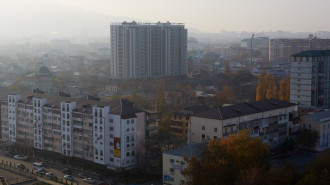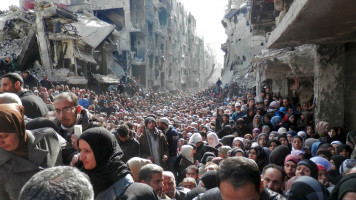Fear, hunger and displacement follows Israel's worsening abuse of Palestinians in Hebron
In Hebron, where approximately 650 illegal Israeli settlers forcefully planted themselves in the heart of an urban Palestinian population and dictate the fate of its roughly 40,000 residents, Palestinians' lives have become an even worse nightmare since 7 October.
"Israel's abuse plays out on every detail of citizens' every day in this part of the West Bank," Issa Amro, a UN-recognised human rights defender and founder of grassroots group Youth Against Settlements, told The New Arab.
In "H2" — the 20 percent of Hebron that is under direct Israeli control and where those settlers reign over the Palestinian-majority population — a labyrinth of checkpoints and a network of barriers that have long been put in place by the Israeli army to control Palestinians and keep them off certain areas and roads, have only got worse.
"In Old Hebron, there are 122 checkpoints and barriers to block movement, including 22 military checkpoints. Of these 22 checkpoints, only six open to allow citizens through, but only partially and at specific hours," explained Amro.
These checkpoints, he noted, close and open according to the whims of Israeli soldiers.
The impact has been drastic on people’s livelihoods, safety, and lives. Restrictions on movement, severe shortage of jobs as Israel has shut its labour market in the face of the 400,000 Palestinians it employed, with many families now facing hunger and starvation.
"Those closed gates, checkpoints, dirt, and cement barriers that block Palestinians' movements have trapped the population into something similar to small cantons," said Issa by phone, adding that the besieged populations aren't able to get their basic needs and essentials, and the hunger and destitute he's seeing is "unprecedented".
As Israel pushes through in its war on Gaza, unhindered by growing global outcry and condemnation for the brutality and scale of the devastation, its army and settlers intensify violations and abuses against the Palestinians across the territories it occupies. These violations, human rights groups show, were already on the rise before the Hamas-led attacks on 7 October, which Israeli leaders have been using as a pretext for a plausible genocide.
In May 2023, Amnesty International in a report dubbed "Automated Apartheid" revealed the Israeli army's usage of an experiential facial recognition system "to track Palestinians and automate harsh restrictions on their freedom of movement". The system, identified as Red Wolf, was being used in Hebron's H2 and East Jerusalem, Amnesty said, and is "part of an ever-growing surveillance network which is entrenching the Israeli government’s control over Palestinians, and which helps to maintain Israel's system of apartheid. Red Wolf is deployed at military checkpoints in the city of Hebron in the occupied West Bank, where it scans Palestinians' faces and adds them to vast surveillance databases without their consent."
Curfews, absence of law
According to Amro, the heightened constraints began on 7 October, with the imposing of a two-week curfew which left households completely impoverished. This curfew eased, he said, but the tightened control over movement of the Palestinian population began.
"These circumstances caused many Palestinian families to lose their income: stores were closed, lost jobs because they weren’t able to show up, and overall movement to and from the old city became a more difficult challenge," he said.
He added, "a state of emergency must be declared in Hebron, where Israel has completely shut out all municipal services, ambulances, and firefighting services. People here are isolated, unable to visit each other or be visited."
Divided into four illegal settlements in Hebron, each cluster of settlers are guarded by around 1,000 Israeli soldiers in compounds akin to "'closed military zones', where Palestinians are denied access." A 2020 UN report said that about 7,000 Palestinians, or 20 percent of the H2 population, live in these access-restricted areas.
Imad Abu Shamseya is one of those Palestinians. Living in Tal Al-Ramaida, a neighbourhood in Old Hebron, he says the daily struggles have multiplied since last October.
"We plan our days around the hours they open and close these gates, between 7am to 7:30pm. But they've also randomly closed certain gates during these hours without any reason, other than to make our lives harder," said Abu Shamseya. After 7:30pm onwards, a complete curfew is applied, he said, during which violators are rounded up, abused and insulted.
"We also live under constant threat of being attacked by violent settlers, who increasingly pick on kids and women. They throw stones at houses and cars, and attack us. I was beaten, thrown stones at, and a settler tried to run over me with his car," said Abu Shamseya.
Endless fear
Abu Shamseya, an owner of a shop in old Hebron, said he had his business shut down by Israeli orders along with 49 others since October, without any clear reason. "Before the war, we could report all these abuses to human rights and legal entities, but since the war, a state of military law is what rules, and we can't even open our mouths," he added.
Alaa Jaber, a 28-year-old Palestinian living in the Jaber neighbourhood of Old Hebron, sees no other justifications for the increased abuse against Palestinians in this part of the occupied West Bank other than to drive them out.
"Around 20 families were forced by these restrictions to leave the Jaber neighbourhood since the war broke out," the young man said. "I was born and raised here, and the abuses we're facing today are unmatched. It left no one unaffected. It left no detail in our lives untouched. We're quietly being pushed to leave through the heightened measures of apartheid," he added.
Asserting that mistreatment and constraints were there before 7 October, Jaber said that the Palestinian population have always found ways to resist, through defying curfews, standing up to abusive settlers, protecting and defending one another. "Now, fear prevails. It's becoming increasingly normal for witnesses to see a Palestinian being abused, and instead of stepping in like we’ve always done to support one another, people just walk past," said the young man, sadly.
According to UN February figures, around 4,000 Palestinians were displaced in 2023 throughout the occupied West Bank, including East Jerusalem, due to policies and practices implemented by Israeli authorities or Israeli settlers. These include at least 34 families, or 200 Palestinians, of whom 82 children, the report said, who "were displaced from H2 area and Masafer Yatta in Hebron, citing increased movement restrictions imposed on their communities by Israeli forces as the primary reason."
This piece was published in collaboration with Egab.
![In Hebron, around 200 people were forced to leave their homes in Hebron as a result of heightened access and movement restrictions and increase in search and arrest operations by Israeli soldiers since 7 October 2023. [Issam Ahmed/TNA]](/sites/default/files/styles/large_16_9/public/2024-05/In%20Hebron%2C%20around%20200%20people%20were%20forced%20to%20leave%20their%20homes%20in%20Hebron%20as%20a%20result%20of%20heightened%20access%20and%20movement%20%20restrictions%20imposed%20by%20Israeli%20forces%2C%20an%20increase%20%20in%20search%20and%20arrest%20operations%20since%207%20Oc.jpg?h=251682ea&itok=LgbZmNYx)
![Houthis [GETTY] Houthis [GETTY]](/sites/default/files/styles/image_330x185/public/media/images/1BC61996-8E5D-4619-BEF9-97500B1EEB61.jpg?h=d1cb525d&itok=k14SARNB)

